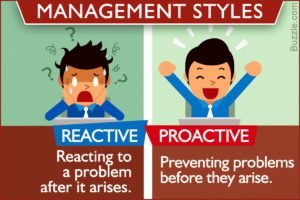Last updated on March 21st, 2024 at 05:32 am
“Management is the art of knowing what needs to be done, and doing it in the best possible way.”
-F.W. Taylor
From the above definition, we can absorb the basic principles behind any form of management; planning and its implementation. Building on these lines business management is scientific as well as the artistic process by which an organization plans, organizes, directs and controls its workings to maximize its profits.
Business management is often regarded as a lucrative career choice offering a wide range of roles from office managers and product managers to chief executive officers. This is also a reason why there has been a sudden upsurge in the demand for business management courses like MBA.
A business manager usually needs to take key decisions about the operations of the business which directly affects its profitability. These decisions are usually domain-specific; financing, marketing, operations and human-resource-management, which maps the overall present and future trajectories of a business.
The relevance of business management in this era cannot be overstated as a business manager acts as the policymaker for organizations
What are some common business management questions and answers
- How businesses contribute to economic development?
The economic development of a country is measured by the growth in the gross domestic product of a country.
 When business enterprises are doing well, they directly increase the GDP of an economy (profitably) leading to an increase in the country’s overall wealth.
When business enterprises are doing well, they directly increase the GDP of an economy (profitably) leading to an increase in the country’s overall wealth.
Moreover, it also generates employment in a nation and increases the standard of living of the people. Therefore, business is the most important contributor to economic development.
- What is a SWOT analysis?
SWOT is the acronym for strengths, weaknesses, opportunities and threats.
 The strengths and weaknesses analyse the internal environmental attributes of a business which are under the control of the organization, whereas, opportunities and threats examine the external environment of the business which the organizations cannot control.
The strengths and weaknesses analyse the internal environmental attributes of a business which are under the control of the organization, whereas, opportunities and threats examine the external environment of the business which the organizations cannot control.
A SWOT analysis is an important tool for managerial decision making and is widely used across multiple business functions.
- How can one ensure that a business remains relevant and competitive?
To ensure that the business is competitive and relevant, one can develop the following strategies:
- Spot emerging trends and developments pro-actively
- Devise a strategy to expand and diversify operations
- Make sure that the company can attract and retain good talent
- Utilize scarcely available resources judiciously
- Keep innovating and satisfying all its stakeholders
- Is management a science or art?
Management is an amalgamation of art and science, containing attributes of both. While on one hand it is based on certain principles, practically conceptualized, through a continuous process of experimentation, on the other, it leverages the creativity of personnel, based on one’s experience and knowledge to achieve desired objectives.
 How could one get better results from its subordinates?
How could one get better results from its subordinates?
Management is the art of getting things done, by people or things. To achieve better results from subordinates one can either delegate authority and responsibility or arrange for employee training.
- In delegation, a manager provides certain operational authority and responsibility to its subordinates, which builds a mutual relationship of trust, thus boosting employee morale and productivity.
- A manager can also enhance the skillset of its employees by various training exercises like mentorship, coaching, seminars and so on.
- What is the difference between pro-active and Reactive decision making?
A pro-active decision constitutes making decisions in advance to plan for future contingencies so that risks are being dealt with even before they crop up.
 A reactive decision making, on the other hand, is one where situations and risks are dealt with, as and when they occur. A reactive decision is taken for emergencies whereas a pro-active decision tries to deal with situational risks through predicting them in advance.
A reactive decision making, on the other hand, is one where situations and risks are dealt with, as and when they occur. A reactive decision is taken for emergencies whereas a pro-active decision tries to deal with situational risks through predicting them in advance.
- Which approach of decision making is more appropriate – centralization or decentralization?
The choice approach completely depends upon the nature of the decision to be made.
When the decision has to be regarding the overall policies of the organization then a concentrated decision taken by a small group of people makes more sense as it ensures coordination throughout the length and breadth of an organization.
Conversely, when a decision on a particular function has to be made, a decentralized decision making allows the organization to leverage the benefits of specialized knowledge of the functional managers.
Therefore, for a decision regarding the debt-equity ratio in the company balance sheet, the company CFO would be more preferable compared to the board of directors who are more likely to take more centralized decisions, like the percentage of shareholder dividend.
- What is BPM life-cycle?
BPM stands for business process management. BPM life-cycle is for continuous business process improvement. It captures the entire business process in a structured way, then monitors and optimizes the process. This cycle of process improvement repeats continuously throughout the life of the processes.
 A Business Management course from Imarticus learning will help you master the art of answering different questions from the business domain.
A Business Management course from Imarticus learning will help you master the art of answering different questions from the business domain.

